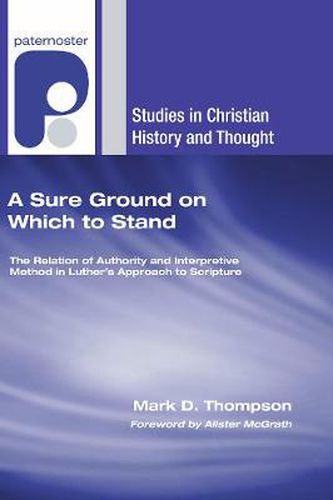Readings Newsletter
Become a Readings Member to make your shopping experience even easier.
Sign in or sign up for free!
You’re not far away from qualifying for FREE standard shipping within Australia
You’ve qualified for FREE standard shipping within Australia
The cart is loading…






Martin Luther’s importance in the history of the doctrine of Scripture is universally acknowledged. However, many modern studies of this aspect of Luther’s thought are colored by attempts to acquire him for one side or other of the contemporary theological debate. Luther has been variously painted as a fundamentalist, the forerunner of biblical criticism, a pragmatist, and even a proto-existentialist. Karl Barth’s idiosyncratic appropriation of the reformer in the first volume of his Church Dogmatics has been particularly influential. This study attempts a fresh examination of the most significant of Luther’s comments on the nature and use of Scripture, locating each in its literary and historical context. It explores a series of connections in Luther’s thought, analyzing his scattered statements in terms of four categories reflected in his own terminology: inspiration (inspiratio), unity (tota scriptura), clarity (claritas scripturae), and sufficiency (sola scriptura). In particular, it seeks to identify those elements that enable Luther to move with confidence between his statements about the authority of Scripture and his interpretive method.
$9.00 standard shipping within Australia
FREE standard shipping within Australia for orders over $100.00
Express & International shipping calculated at checkout
Martin Luther’s importance in the history of the doctrine of Scripture is universally acknowledged. However, many modern studies of this aspect of Luther’s thought are colored by attempts to acquire him for one side or other of the contemporary theological debate. Luther has been variously painted as a fundamentalist, the forerunner of biblical criticism, a pragmatist, and even a proto-existentialist. Karl Barth’s idiosyncratic appropriation of the reformer in the first volume of his Church Dogmatics has been particularly influential. This study attempts a fresh examination of the most significant of Luther’s comments on the nature and use of Scripture, locating each in its literary and historical context. It explores a series of connections in Luther’s thought, analyzing his scattered statements in terms of four categories reflected in his own terminology: inspiration (inspiratio), unity (tota scriptura), clarity (claritas scripturae), and sufficiency (sola scriptura). In particular, it seeks to identify those elements that enable Luther to move with confidence between his statements about the authority of Scripture and his interpretive method.